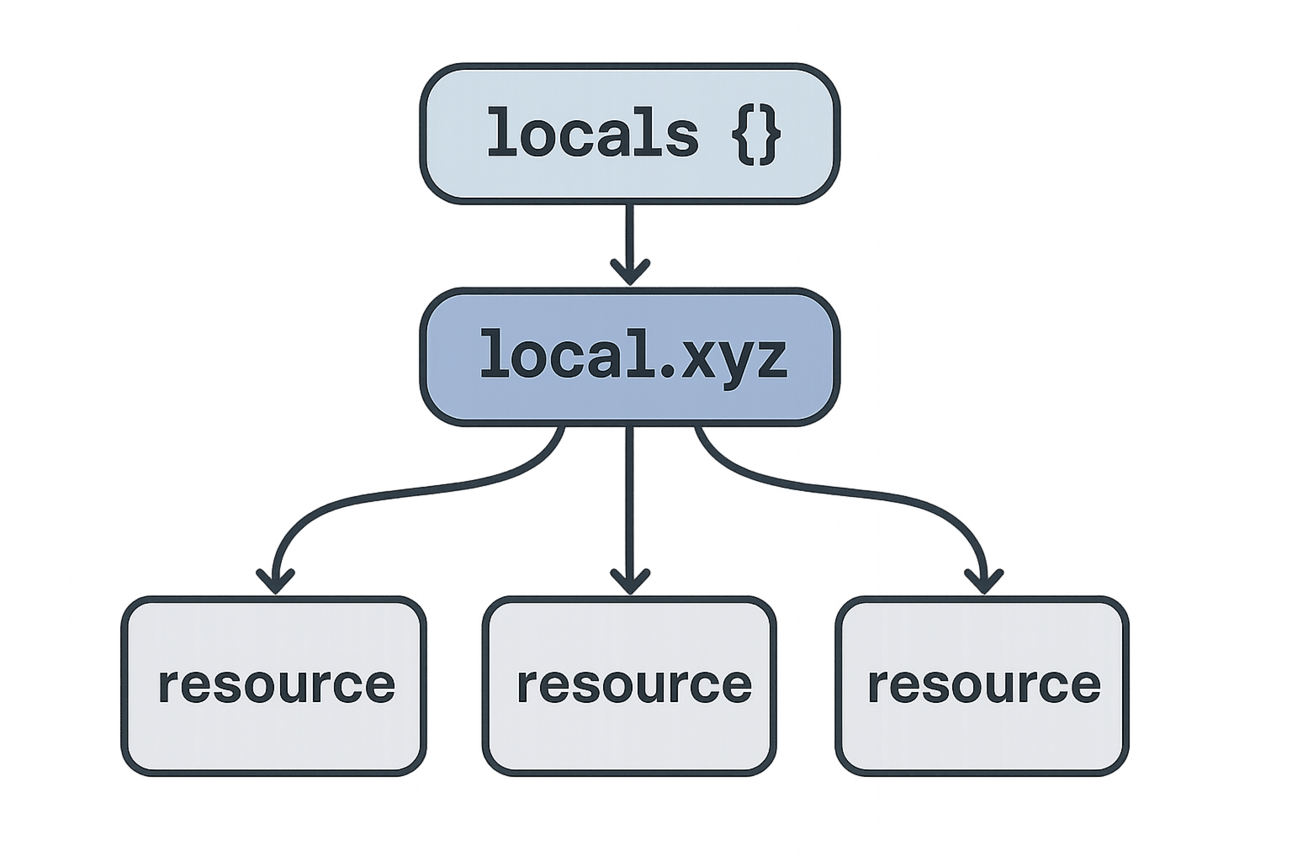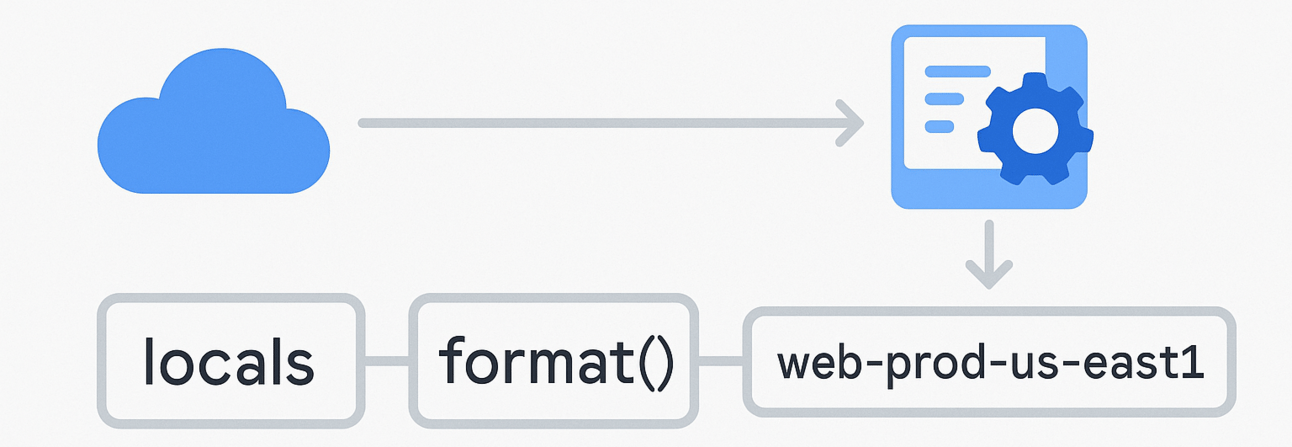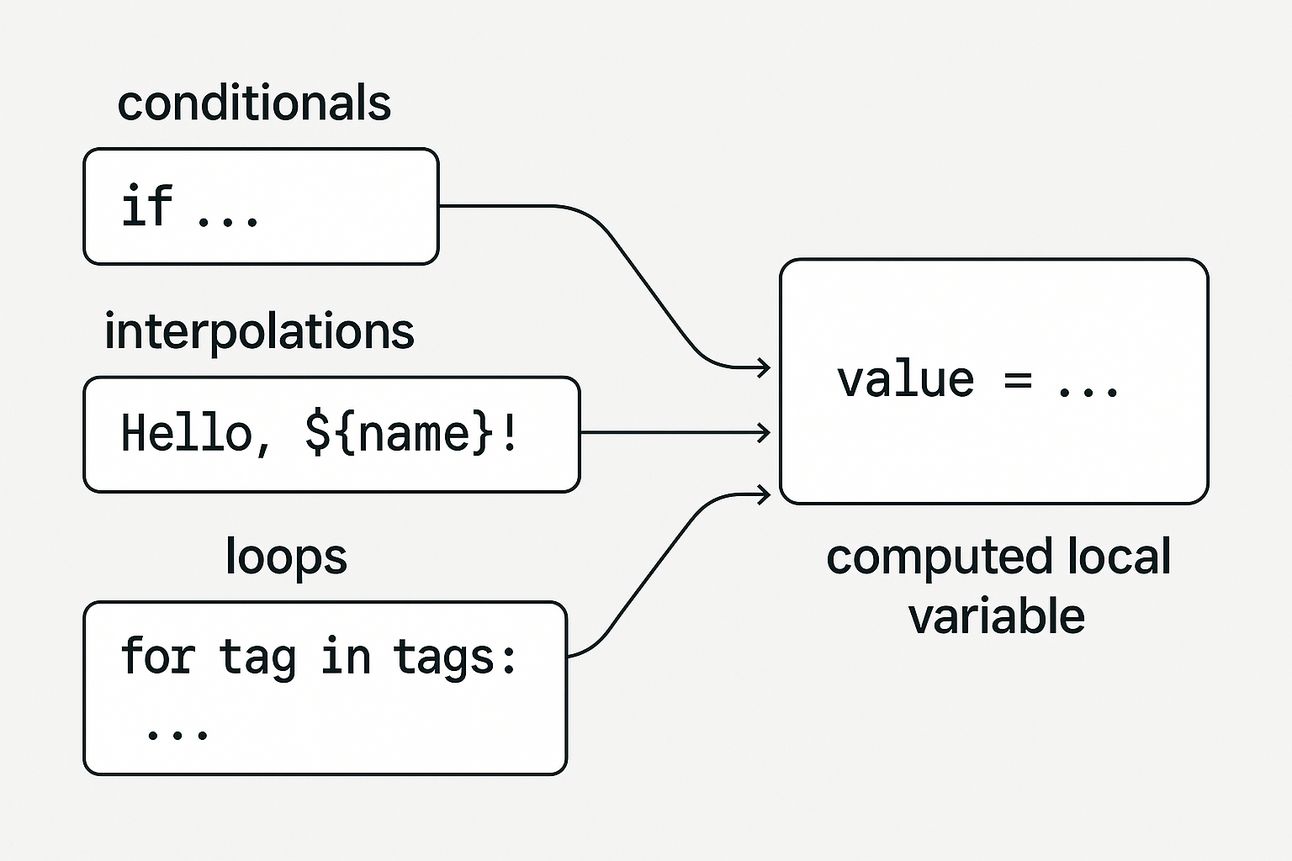
👋 Hey there, I’m Dheeraj Choudhary an AI/ML educator, cloud enthusiast, and content creator on a mission to simplify tech for the world.
After years of building on YouTube and LinkedIn, I’ve finally launched TechInsight Neuron a no-fluff, insight-packed newsletter where I break down the latest in AI, Machine Learning, DevOps, and Cloud.
🎯 What to expect: actionable tutorials, tool breakdowns, industry trends, and career insights all crafted for engineers, builders, and the curious.
🧠 If you're someone who learns by doing and wants to stay ahead in the tech game you're in the right place.

What Are Locals in Terraform?

Local values let you define a named value once, and use it multiple times throughout your configuration.
Instead of repeating:
resource "aws_s3_bucket" "logs" {
bucket = "${var.project_name}-${var.env}-logs"
}You can define it cleanly:
locals {
bucket_name = "${var.project_name}-${var.env}-logs"
}
resource "aws_s3_bucket" "logs" {
bucket = local.bucket_name
}Now you have a central place to update naming logic or calculated values.
Common Use Cases for Locals
Naming conventions (e.g., app-environment-region)
Shared tags
Common resource names
Complex expressions simplified for reuse
Nested conditionals or long functions extracted for clarity
Terraform Functions Overview

Terraform has a rich set of built-in functions to transform data. They're grouped into:
Type | Examples |
|---|---|
String |
|
Numeric |
|
Date/Time |
|
Collections |
|
Encoding |
|
Type Checking |
|
🧪 Example 1: Naming Standard
locals {
resource_name = format("%s-%s-%s", var.project, var.env, var.region)
}Output: myapp-prod-us-east-1
🧪 Example 2: Shared Tags
locals {
common_tags = {
project = var.project
env = var.env
managedby = "terraform"
}
}
resource "aws_s3_bucket" "logs" {
bucket = "my-bucket"
tags = local.common_tags
}Expressions in Terraform

Expressions are combinations of values and operators that compute a value.
You’ve seen these already in action:
Interpolation:
"${var.region}-logs"Conditional:
var.enabled ? "on" : "off"For loops:
for x in var.tags : upper(x)Merging maps or lists
🔁 For Expressions
locals {
upper_tags = [for tag in var.tags : upper(tag)]
}❓ Conditional Expression
locals {
instance_type = var.env == "prod" ? "t3.large" : "t3.micro"
}This replaces multi-block logic with elegant, readable one-liners.
Hands-On Example: Smarter Infra Config with Locals + Functions
variables.tf
variable "env" {
type = string
default = "dev"
}
variable "project" {
type = string
default = "mlplatform"
}
variable "region" {
type = string
default = "us-east-1"
}locals.tf
locals {
standard_name = format("%s-%s-%s", var.project, var.env, var.region)
common_tags = {
project = var.project
env = var.env
owner = "ml-team"
}
instance_type = var.env == "prod" ? "t3.large" : "t3.micro"
}main.tf
resource "aws_instance" "web" {
ami = "ami-0c55b159cbfafe1f0"
instance_type = local.instance_type
tags = local.common_tags
}Your config is now clean, DRY, and easily reusable across environments.
Common Pitfalls / Pro Tips
✅ Name your locals logically, as you would variables
✅ Use format() instead of string concatenation
✅ Don’t overuse locals — they’re for logic, not input values
✅ Split locals into locals.tf file for clarity
✅ Use can() and try() for defensive logic in expressions
💡 Tip of the Day:
Locals aren't just convenience they’re infrastructure patterns. When used well, they bring clarity, reduce errors, and turn your .tf files into maintainable code, not just static declarations.
📚 Resources & References
1️⃣ Terraform Locals Documentation
🔗 Docs
How to define reusable values inside your configuration.
2️⃣ Terraform Functions List
🔗 Docs
Full list of built-in string, numeric, list, and utility functions.
3️⃣ Expressions in Terraform
🔗 Docs
Guide on using operators, loops, conditionals, and interpolations.
4️⃣ Best Practices for Reusability
🔗 HashiCorp Learn
Clean, modular infra code with locals and functions.
5️⃣ Using can() and try() in Terraform
🔗 Defensive Programming
How to write safe, fault-tolerant expressions.
🔗Let’s Stay Connected
📱 Join Our WhatsApp Community
Get early access to AI/ML, Cloud & Devops resources, behind-the-scenes updates, and connect with like-minded learners.
➡️ Join the WhatsApp Group
✅ Follow Me for Daily Tech Insights
➡️ LinkedIN
➡️ YouTube
➡️ X (Twitter)
➡️ Website
Conclusion
You’ve now added one of the most powerful tools to your Terraform toolbox: the ability to compute, abstract, and simplify your infra logic using locals, functions, and expressions.
You’ve moved from declarative scripting to declarative programming and that’s a leap forward in code clarity and engineering maturity.
In the next blog, we’ll explore Terraform Modules the key to breaking up large configs and making your infrastructure code scalable and reusable across teams and environments.

